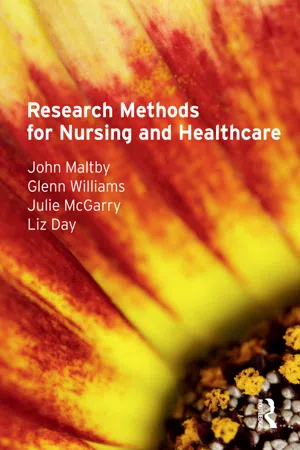
Research Methods for Nursing and Healthcare
- 400 pages
- English
- ePUB (mobile friendly)
- Available on iOS & Android
Research Methods for Nursing and Healthcare
About this book
Research Methods for Nursing and Healthcare is an essential introductory text for all nursing and healthcare students coming to research methods for the first time or those nurses and healthcare staff wishing to improve their skills in this area. The book includes comprehensive coverage of the main research methods topics, and provides guidance on how to understand and apply research techniques. Everyday nursing examples are used throughout to explain research methods concepts and their relevance to practice. Simple self-assessment tasks are included at the end of chapters; the tests can be undertaken individually, or within groups, to assess the students understanding of the concepts and skills being learnt. Research Methods for Nursing and Healthcare takes the fear out of research methods for all nursing and healthcare professionals.
Excellent introductory text that brings interest to research methods for student nurses.Dr Aimee Aubeeluck, Deputy Director: Graduate Entry Nursing, School of Nursing, Midwifery and Physiotherapy University of Nottingham
"I think this is one of the most readable books on research I have read. Not the most scholarly, but that was not the intention. It is certainly the most user friendly book that will make the whole, often scary, subject of research less threatening."Paula Crick, Principal Lecturer, Faculty of Health, Staffordshire University
"I do think this is one of the most engaging texts aimed at nursing that I have read in a while... This does seem much more exciting and more importantly. real world"Lucy Land, Senior Academic, Centre for Health and Social Care Research Faculty of Health Birmingham City University
"Useful resource for our students dissertation which can be a literature review or a research proposal" Melanie Brooke-Read, Department of Health & Social Studies, University of Bedfordshire
"Excellent text book which actually takes away the 'fear' of research within healthcare"
Angela Cobbold, Institute of Health & Social Care, Anglia Ruskin University
"The text is very comprehensive and I found chapter 7 on action research particularly useful in supporting a student I was supervising. I also like the self assessment exercises which I intend to incorporate in my teaching strategy."Ms. Mulcahy, School of Nursing and Midwifery, University College Cork.
Frequently asked questions
- Essential is ideal for learners and professionals who enjoy exploring a wide range of subjects. Access the Essential Library with 800,000+ trusted titles and best-sellers across business, personal growth, and the humanities. Includes unlimited reading time and Standard Read Aloud voice.
- Complete: Perfect for advanced learners and researchers needing full, unrestricted access. Unlock 1.4M+ books across hundreds of subjects, including academic and specialized titles. The Complete Plan also includes advanced features like Premium Read Aloud and Research Assistant.
Please note we cannot support devices running on iOS 13 and Android 7 or earlier. Learn more about using the app.
Information












Table of contents
- Cover Page
- Half Title Page
- Title Page
- Copyright Page
- Brief Contents
- Contents
- Preface
- Acknowledgements
- 1 An Introduction to research methods
- 2 Quantitative methodologies and research designs
- 3 Qualitative research methodologies and methods
- 4 Reading the literature and generating research ideas
- 5 Setting up your study Methods in data collection
- 6 Qualitative analysis A step-by-step guide
- 7 Blending qualitative and quantitative methods Action research
- 8 Quantitative analysis Using descriptive statistics
- 9 Interpreting inferential statistics in quantitative research
- 10 Critical appraisal of quantitative and qualitative research
- 11 Presenting your work to others
- 12 Advanced thinking in research methods and practice From novice to expert nurse researcher
- 13 Going forward A step-by-step guide from research idea to ethics application
- Answers to self-assessment exercises
- Glossary
- References
- Index